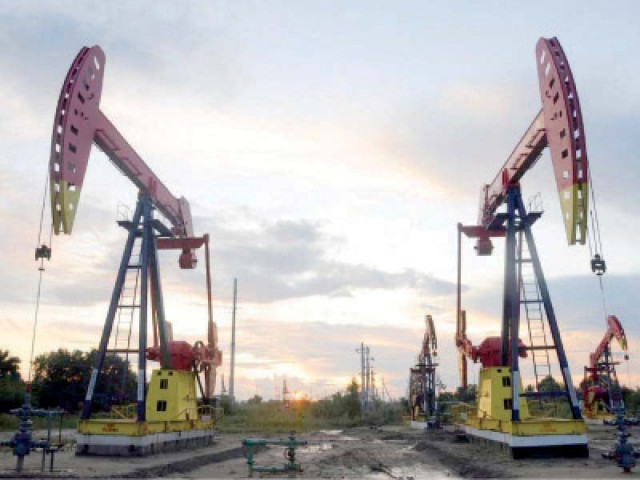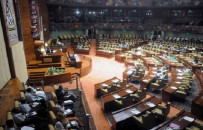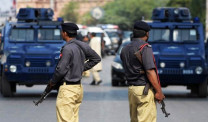After much ado, increase in gas rates approved
Cabinet okays Hajj package which is Rs100,000 less expensive than last year

The federal cabinet on Monday approved up to 193% increase in gas prices to recover an additional Rs350 billion from consumers in this fiscal year while making some further adjustments in the recommended rates for industrial and CNG consumers.
Headed by Prime Minister Anwaarul Haq Kakar, the cabinet approved up to 172% increase for domestic consumers, 137% increase for commercial consumers and 193% increase in prices for cement manufacturers with effect from Nov 1.
The cabinet referred back the proposed increases for processing units of non-export and export industries, captive power plants of non-export and export industries and the compressed natural gas (CNG) consumers to the Economic Coordination Committee (ECC) of the Cabinet for further deliberations.
The cabinet decided that if the ECC develops consensus on the rates for these categories, it should be deemed as approved by the federal cabinet, Mohammad Ali, the federal minister for energy, said.
Ali said that the ECC met on Monday after the cabinet meeting and approved the revised rates for processing units of non-export and export industries, captive power plants of export and non-export industry and the CNG stations.
Interim Finance Minister Dr Shamshad Akhtar chaired the ECC meeting.
The energy minister said that the new rates have been approved with effect from Nov 1 and the changes made for certain categories would not have any adverse impact on the revenue requirements.
The gas rates for captive power plants and processing units of exporters have been further increased and for the non-export categories have been reduced to minimise the gap.
The gas prices for 57% of the domestic consumers have not been increased, according to a statement issued by the Ministry of Energy. It added that the fixed bill of Rs400 per month is being introduced which is a negligible amount.
“As a matter of fact, this country cannot afford to give a scarce resource on giveaway prices. It is still ensured that the monthly bill of the protected class does not exceed Rs900 on a consumption of 0.9 hm3 in a month,” the energy ministry said.
The fixed monthly charge for consumption up to 1.5 hm3 has been increased from Rs460 to Rs1,000 while for consumption of over 1.5 hm3, it has been increased to Rs2,000 per month, according to the decision.
The tariffs for the highest domestic consumption are aligned with the liquefied petroleum gas (LPG) cost, according to the decision.
The previous slab’s benefits are being maintained up to consumption of 4 hm3 but there will not be any of its benefit in the last slab of non-protected domestic category.
The gas price for up to 0.25 hm3 consumption has been increased by 50% to Rs300 per mmbtu, it has been doubled to Rs600 for 0.6 hm3 consumption and the rate is increased to Rs1,000 per mmbtu –an increase of 150% -- for 1 hm3 consumption.
For up to 1.5hm3 consumption, the federal cabinet doubled the rate to Rs1,200 per unit, for up to 2 hm3 consumption, it is also doubled to Rs1,600 per mmbtu.
For up to 3 hm3 consumption, the maximum increase of 172% has been approved and the new price is set at Rs3,000 per mmbtu.
The rates for the upper two slabs have been increased even higher than the LGP and the LNG prices.
For 4 hm3 consumption, it has been increased to Rs3,500 per mmbtu and for the highest slab, it has been jacked up to Rs4,000 –much higher than the imported gas price to pay for subsidies to the richest.
The energy ministry stated that the pricing decision has been a very difficult one for the caretaker government. The affordability objective had a major clash with the sustainability argument of the supply chain.
“It's known that we are under the IMF program which has abolished subsidies of all sorts,” the ministry added.
The price revision for all categories of gas consumers is essential to prevent the two gas distribution companies – Sui Northern Gas Pipelines Limited (SNGPL) and Sui Southern Gas Company Limited (SSGCL) – from bankruptcy.
The energy ministry said that drastic devaluation of the rupee against the dollar has raised the cost of gas besides general inflation, which has increased the cost of gas exploration, production, distribution and transmission.
It added that the previous governments retained control of pricing a scarce commodity instead of strengthening the regulator and creating strong internal controls in the system for transparency and efficiency.
Inadequate gas pricing in the previous governments and no financing for the imported gas diversion over the years dented the national exchequer and created a circular debt stock of Rs2.1 trillion in the gas sector, according to the Ministry of Energy.
The government increased the prices of gas being consumed by exporters from Rs1,100 to Rs2,400 per mmbtu, an increase of Rs1,300 or 118%.
Earlier, the ECC had approved Rs2,050 per mmbtu rate, which was further increased by Rs350 per mmbtu.
There was a view that the difference between export and non-export industries should be minimal, Mohammad Ali said.
The rate of gas for processing units owned by the exporters has been revised upwards from Rs1,100 to Rs2,100 per mmbtu –an increase of Rs1,000 or 91%.
Due to shortage of local gas, Pakistan imports expensive LNG and supplies it to the domestic sector in winters and to the industry throughout the year.
The current cost of imported LNG is Rs3,650 or $12.5 per mmBtu.
For those industrialists who are not exporting goods but have captive plants, the ECC increased the prices from Rs1,200 to Rs2,500 per mmbtu, an increase of Rs1,300 or 108%. It was Rs100 per mmbtu less than approved by the ECC last week.
For the processing units of non-export industry, the ECC approved Rs2,200 per mmbtu rate ,which is Rs1,000 or 83% higher than the existing rates.
For the CNG consumer, the government on Monday approved Rs3,600 per mmbtu rate –up by Rs1,795 or 100% over the existing rates. But it was Rs800 per mmbtu less than the one approved by the ECC last week, according to the energy ministry’s statement.
The efficiency adjusted cost of CNG is almost half of that of petrol in equivalent terms, it added.
In the name of affordability, some of the most profitable businesses of the country are availing the cheapest natural gas, the energy ministry said. This has unduly enriched certain sectors while depriving the lowest income class, including poor farmers and small-scale industries, it added.
In case the caretaker government does not proceed to increase prices as per Ogra's advice and fund the RLNG diversion to domestic segment in absence of subsidies, there shall be a further addition in circular debt of around Rs400 billion, according to the ministry.
The energy ministry said that the government has completely kept the prices unchanged for gas supply to tandoors because "Roti" is the prime and foremost necessity.
The fertiliser prices are kept in line with Mari gas field's cost of gas which is Rs580 per mmbtu, only a Rs70 increase over the previous price just not to affect the farmers getting urea and ensure food security, it added.
Hajj policy
Information Minister Murtaza Solangi told reporters that the cabinet approved the Hajj Policy 2024 under which 179,210 people would perform Hajj under a quota equally divided between public and private schemes.
He said that 25,000 pilgrims would perform Hajj under the Hajj sponsorship scheme, while a Hajj package of 25-day stay in Saudi Arabia would also be introduced. The minister said that the ‘Road to Makkah’ would be available at the Islamabad airport and it would be extended to Karachi and Lahore.
“The Hajj package for 38 to 42 days stay has been fixed at Rs1.65 million for the southern region of the country and Rs1.75 million for the northern region. This package is Rs100,000 less than last year. Under the new Hajj policy, women will be able to perform Hajj without Mehram,” he added.



















COMMENTS
Comments are moderated and generally will be posted if they are on-topic and not abusive.
For more information, please see our Comments FAQ